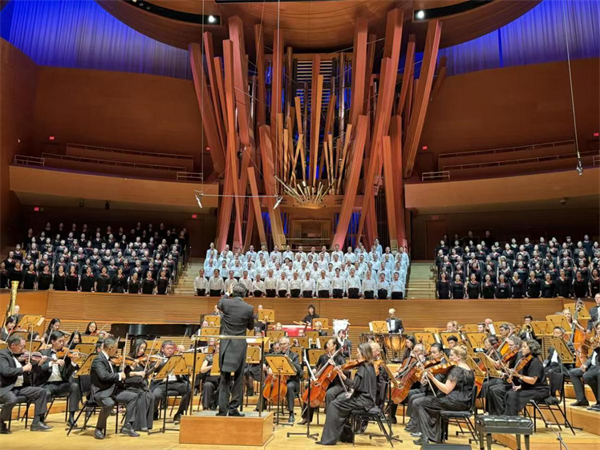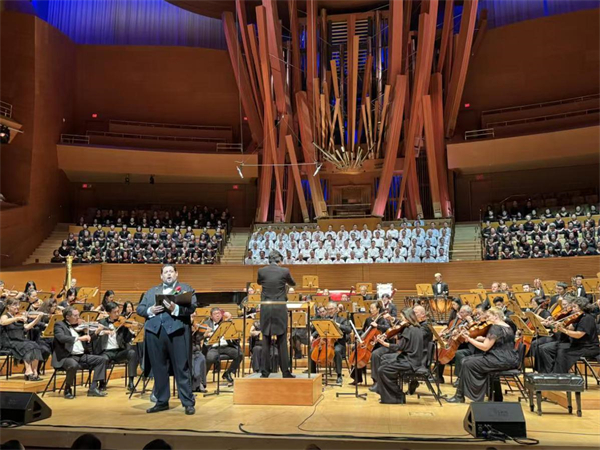
The chorus performs Roar! Yellow River, conducted by Zhang Liang, during the Yellow River Cantata Concert at Walt Disney Concert Hall in Los Angeles on Aug 23, commemorating the 80th anniversary of victory in World War II. (RENA LI/CHINA DAILY)
"The Yellow River is roaring, the Yellow River is roaring!"
When the majestic chorus of the Yellow River Cantata resounded through the Walt Disney Concert Hall in Los Angeles, accompanied by the full power of a symphony orchestra, the audience was transported back to the wartime years when the Chinese people courageously resisted Japanese fascism.
History and modernity converged at the commemorative event, as overseas Chinese in the United States used music to honor their motherland's sacrifice and resilience, while also expressing their shared yearning for peace.
Co-organized by the Roundtable of Chinese American Organizations and Chinese communities across Southern California, the large-scale concert brought together nearly 300 orchestral musicians and choir members to mark the 80th anniversary of victory in the Chinese People's War of Resistance Against Japanese Aggression and the World Anti-Fascist War.
"While the victory was momentous, it came at great cost," Lu Qiang, the concert's chief planner, told China Daily. "We have enjoyed 80 years of peace because of the sacrifices. Yet today, we still see war and hunger in the world. This makes our responsibility even greater, and through today's concert, we hope to awaken everyone to join together in safeguarding world peace."
First performed in 1939, the Yellow River Cantata remains one of the most important works in modern Chinese classical music. Composer Xian Xinghai blended Western forms such as the cantata and symphony with traditional Chinese folk melodies and instruments. Set to poet Guang Weiran's patriotic verses, the work became a rallying cry that inspired millions during the war of resistance.
Eighty years later, its power remains undiminished. Huang Hongjiang, deputy consul general of China in LA, emphasized the enduring symbolic force of the Yellow River and its music.
"The Yellow River has borne witness to the suffering and struggle of the Chinese nation and nurtured its resilience and strength. Over 80 years ago, at the critical juncture of national survival, the Yellow River Cantata came into being, inspiring hundreds of millions of Chinese people to fight bravely and becoming a battle song that rallied the nation's strength," Huang told the audience.
He also urged reflection on history's lessons.
"Eighty years ago, the Chinese and American peoples shared a common hatred for the enemy and fought side by side to safeguard peace and justice. History teaches us that only through unity and cooperation can we overcome common challenges, and only through mutual respect can we avoid the tragedy of conflict."
Huang stressed that as the world's two largest economies and permanent members of the UN Security Council, China and the US bear special responsibility.
"We should develop our relations with a sense of responsibility to history, to our peoples and to the world, jointly promoting peace and friendship," he said.

Baritone soloist Jose Luis Maldonado performs Ode to the Yellow River with the symphony orchestra conducted by Zhang Liang at the Yellow River Cantata Concert, held on Aug 23 at Walt Disney Concert Hall in Los Angeles to commemorate the 80th anniversary of victory in World War II. (RENA LI/CHINA DAILY)
US Congresswoman Judy Chu, whose father served in the US Army during World War II, highlighted the deep cooperation between two sides in securing victory.
"The victory would not have been possible without the cooperation of the US and China, as well as the sacrifices of American soldiers who fought bravely as part of the Flying Tigers," Chu said. "Some 20,000 Chinese Americans also served our country despite the Chinese Exclusion Act and widespread discrimination."
The concert's finale was hailed as "world-class" by attendees. Alongside the monumental Yellow River Cantata, audiences were moved by American works including the violin solo Theme from Schindler's List and the duet There You'll Be from Pearl Harbor, bridging historical memory across cultures.
Film producer Frederick Golchan said he was deeply moved. "I enjoyed the concert tremendously. There was a lot of diversity, a lot of great talent, and obviously the last piece, the Yellow River, was quite beautiful. It truly honored the commemoration of the war and the liberation of China," he told China Daily.
For many in attendance, the performance underscored how music continues to serve as a universal language of remembrance and peace.
Before the concert, the Walt Disney Concert Hall also hosted the release of The Daughter of the Peace General — Building Bridges Between China and USA, co-authored by Zhang Sujiu and Peter Kjenaas.
Zhang, daughter of General Zhang Zhizhong, known as the "Peace General," has been a community leader in Southern California for more than four decades. She has dedicated her life to strengthening peace, friendship and cultural exchange between China and the US.
"With this book done, my lifetime task is completed," Zhang told China Daily. She explained that she chose to publish the memoir, which contains more than 270 photos, in English to reach a wider international audience. "I hope Chinese Americans and friends from all backgrounds can better understand our shared history and continue fostering long-term friendship between China and the US."
US Senator Bob Archuleta praised Zhang's contributions.
"Her story reflects a life of leadership, perseverance and service to the community. It is not only a personal journey, but also a powerful testament to people-to-people diplomacy. It ensures that future generations will understand the values of mutual respect, collaboration and peace," Archuleta said.
Educator and writer Mark Rafter also shared his admiration for Zhang's memoir. "The more I read, the more it drew me in the behind-the-scenes stories of history, and how she, living in the shadow of her famous father, forged her own legacy in America," Rafter said.
"I believe this book should be in all high schools and colleges. We must never forget the great sacrifices made for what we have today," he added.